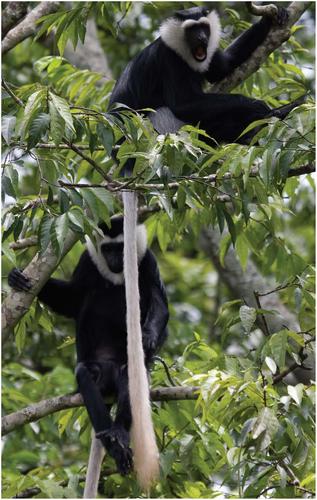当前位置:
X-MOL 学术
›
Am. J. Primatol.
›
论文详情
Our official English website, www.x-mol.net, welcomes your
feedback! (Note: you will need to create a separate account there.)
Joint intergroup aggression in female colobus monkeys (Colobus vellerosus) is associated with grooming bonds, male participation, and group size
American Journal of Primatology ( IF 2.0 ) Pub Date : 2021-12-20 , DOI: 10.1002/ajp.23355 Eva C Wikberg 1 , Sofia Gonzalez 1 , Cynthia Rodriguez 1 , Pascale Sicotte 2, 3
American Journal of Primatology ( IF 2.0 ) Pub Date : 2021-12-20 , DOI: 10.1002/ajp.23355 Eva C Wikberg 1 , Sofia Gonzalez 1 , Cynthia Rodriguez 1 , Pascale Sicotte 2, 3
Affiliation

|
Cooperative home range defense is common in primates, despite a collective action problem that arises when group members benefit from winning the intergroup encounter regardless of whether they participate. The costs associated with this collective action problem may be mitigated by residing in small groups, residing with kin, or by forming strong bonds with group members. The potential to decouple the effects of these variables provided an opportunity to investigate which of these three variables best explains coparticipation in intergroup encounters among adult and subadult female colobus at Boabeng-Fiema, Ghana. Because males are often the main participants, we also investigated the relationship between female–female coparticipation and adult and subadult male participation. We collected intergroup behaviors from 94 adult and subadult individuals in eight groups during 1 year. We quantified female grooming bond strength and approach rates using focal samples. We classified female dyads as close kin (i.e., halfsiblings or more closely related) or nonkin based on partial pedigrees and genotypes generated from 17 STR loci. Female–female coparticipation was higher in dyads with stronger grooming bonds but was not associated with dyadic kinship, approach rate, or age class. Female coparticipation decreased with increasing female group size as expected if there is a collective action problem. Females coparticipated less in groups with more males and male intergroup aggression, possibly because there is less need for female–female cooperation if males are participating in the intergroup encounter. Females in smaller groups may not only benefit from increased female–female cooperation during intergroup encounters, they are also likely to reside with a higher-quality alpha male, both of which may increase the likelihood of winning intergroup encounters. There may be strong selection for facultative female dispersal in populations like the Boabeng-Fiema colobus in which small groups are associated with multiple benefits and cooperation is not affected by kinship.
中文翻译:

雌性疣猴( Colobus vellerosus )的联合群际攻击与梳理联系、雄性参与和群体规模有关
尽管集体行动问题会出现在群体成员从赢得群体间遭遇中受益时,而不管他们是否参与,合作的家庭范围防御在灵长类动物中很常见。与这个集体行动问题相关的成本可以通过居住在小团体中、与亲属同住或通过与团体成员建立牢固的联系来减轻。将这些变量的影响解耦提供了一个机会,可以研究这三个变量中的哪一个最能解释加纳 Boabeng-Fiema 成年和亚成年雌性疣猴在群体间遭遇中的共同参与。因为男性通常是主要参与者,我们还调查了女性-女性共同参与与成年和亚成年男性参与之间的关系。我们在 1 年内收集了 8 组 94 名成年和亚成年个体的组间行为。我们使用焦点样本量化了女性修饰粘合强度和接近率。我们根据从 17 个 STR 基因座产生的部分谱系和基因型将雌性 dyad 分类为近亲(即半兄弟姐妹或更密切相关)或非近亲。在具有较强梳理关系的二元组中,女性-女性共同参与度较高,但与二元亲属关系、接近率或年龄层无关。如果存在集体行动问题,如预期的那样,随着女性群体规模的增加,女性的共同参与会减少。女性在男性较多且男性群体间攻击性较高的群体中参与较少,这可能是因为如果男性参与群体间相遇,女性与女性合作的需求较少。较小群体中的女性不仅可能受益于群体间相遇期间增加的女性与女性之间的合作,而且她们也可能与质量更高的阿尔法男性同居,这两者都可能增加赢得群体间相遇的可能性。在像 Boabeng-Fiema colobus 这样的种群中,可能存在对兼性女性散布的强烈选择,其中小群体与多种利益相关联,并且合作不受亲属关系的影响。
更新日期:2022-02-10
中文翻译:

雌性疣猴( Colobus vellerosus )的联合群际攻击与梳理联系、雄性参与和群体规模有关
尽管集体行动问题会出现在群体成员从赢得群体间遭遇中受益时,而不管他们是否参与,合作的家庭范围防御在灵长类动物中很常见。与这个集体行动问题相关的成本可以通过居住在小团体中、与亲属同住或通过与团体成员建立牢固的联系来减轻。将这些变量的影响解耦提供了一个机会,可以研究这三个变量中的哪一个最能解释加纳 Boabeng-Fiema 成年和亚成年雌性疣猴在群体间遭遇中的共同参与。因为男性通常是主要参与者,我们还调查了女性-女性共同参与与成年和亚成年男性参与之间的关系。我们在 1 年内收集了 8 组 94 名成年和亚成年个体的组间行为。我们使用焦点样本量化了女性修饰粘合强度和接近率。我们根据从 17 个 STR 基因座产生的部分谱系和基因型将雌性 dyad 分类为近亲(即半兄弟姐妹或更密切相关)或非近亲。在具有较强梳理关系的二元组中,女性-女性共同参与度较高,但与二元亲属关系、接近率或年龄层无关。如果存在集体行动问题,如预期的那样,随着女性群体规模的增加,女性的共同参与会减少。女性在男性较多且男性群体间攻击性较高的群体中参与较少,这可能是因为如果男性参与群体间相遇,女性与女性合作的需求较少。较小群体中的女性不仅可能受益于群体间相遇期间增加的女性与女性之间的合作,而且她们也可能与质量更高的阿尔法男性同居,这两者都可能增加赢得群体间相遇的可能性。在像 Boabeng-Fiema colobus 这样的种群中,可能存在对兼性女性散布的强烈选择,其中小群体与多种利益相关联,并且合作不受亲属关系的影响。











































 京公网安备 11010802027423号
京公网安备 11010802027423号